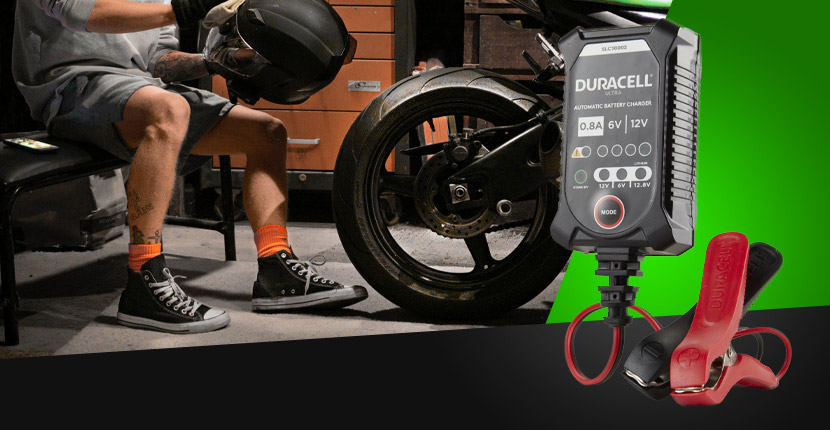How to Maintain Seasonal Vehicles During the Winter Months
- by Bryan Veldboom - updated on 10/8/2020

In many parts of the country, winter is just a few months away. That means it's time to start putting warm weather vehicles into storage. Here are a few basic tips to help you maintain your golf cart, watercraft, ATV or UTV during the cold months ahead.
Keep Your Battery Maintained with a Charger
This is the number one rule to keep in mind with any vehicle that's sitting for an extended period of time. Letting your vehicle's battery run down too low can have a negative impact on its overall life cycle. Worst of all, if you let it discharge too low, it might not be able to be recovered.
That's why it's important to have a battery charger or maintainer on hand to keep your battery charged up when it's not being used. The first thing to keep in mind when shopping for a charger is to make sure that the charger matches the chemistry of your vehicle's battery. For instance, if your ATV runs on an AGM battery be sure that the charger you buy is compatible with AGM batteries. This is important to remember, because charging a battery with an incompatible charger can cause damage to the battery.
When it comes to golf carts, you'll also want to identify whether your model has a 6-volt or 8-volt battery and find a charger designed for that particular voltage. For jet skis and other watercraft, it's good idea to find a charger that is waterproof or, at the very least, water resistant. This is especially important if you plan on mounting the charger onto the watercraft itself or plan on carrying it aboard when you're on the water.
Avoid Overcharging
Be sure to avoid overcharging, as it will damage your battery and ultimately shorten its lifespan. Depending on the type of charger you buy, you may need to monitor it and turn it off manually to avoid overcharging your battery.
If you are looking for a self-monitoring option, look for a charger that has a "maintenance" or "float" mode that will switch off when your battery reaches a full charge. Battery maintainers are another great option. These automatic chargers continuously monitoring your battery, cutting off power when it's reached a full charge and recharging it again once it drops below an ideal voltage. It's a perfect option for people who want a simple, set-it-and-forget-it option that doesn't require additional monitoring.
Charger Suggestions
X2Power 0.8 Amp Charger – A great choice for motorcycles, ATVs and UTVs. It is compatible with flooded, gel, lithium and AGM chemistry and charges both 6-volt and 12-volt batteries.
X2Power Automatic Marine Battery Charger – This rugged charger is a perfect fit for boats and watercraft. It's water resistant up to 4.9 ft. and can be permanently mounted to a battery housing either on or inside a boat for extra convenience.
Schauer 36V 20A Charger – If your golf cart features 6-volt batteries, this is the charger for you. It charges both flooded and AGM batteries and comes with a maintenance float feature to avoid overcharging. Plus, it's 15% faster than your average automatic charger.
Schauer 48V 15A Charger – This charger is designed for golf carts that run on 8-volt batteries. Like it's 6-volt battery equivalent, this model has a maintenance float feature and works with both flooded and AGM batteries. It's also 15% faster than a conventional automatic charger.
Disconnecting Vehicle Batteries
Ideally, it's recommended that you remove the battery from a golf cart, watercraft, UTV or ATV if it's going to be sitting idle for some time. In the unlikely event that there's an electrical spike while the charger is connected to your battery, you don't want it to cause damage to the vehicle's electrical system.
Removing the battery might not always be possible, however. If the battery is too heavy to move or housed in a difficult-to-reach location, you can simply disconnect the battery's terminals instead.
If you do end up removing the battery from the vehicle entirely, it's a good idea to keep it secured away from the elements in a dry place. We also recommend picking up a battery box. These sturdy cases will help protect your battery from dirt, moisture, sun and extreme temperatures, all of which can have a negative impact on its performance.
Cleaning the battery's terminals with an anti-corrosion spray is another great way to keep it in optimal condition. If you notice that the terminals already contain corrosion, you can clean it using a battery terminal brush and a solution of baking soda and water.
Testing Your Battery's Condition
Concerned about a battery's performance? Simply bring it in to your local Batteries Plus Bulbs for a free test. We'll let you know if it's still going strong, or whether it's time for a replacement. If you do need a new battery, we can help you find the best option for your golf cart, watercraft, ATV or UTV. Plus, we can even help you recycle your old battery.